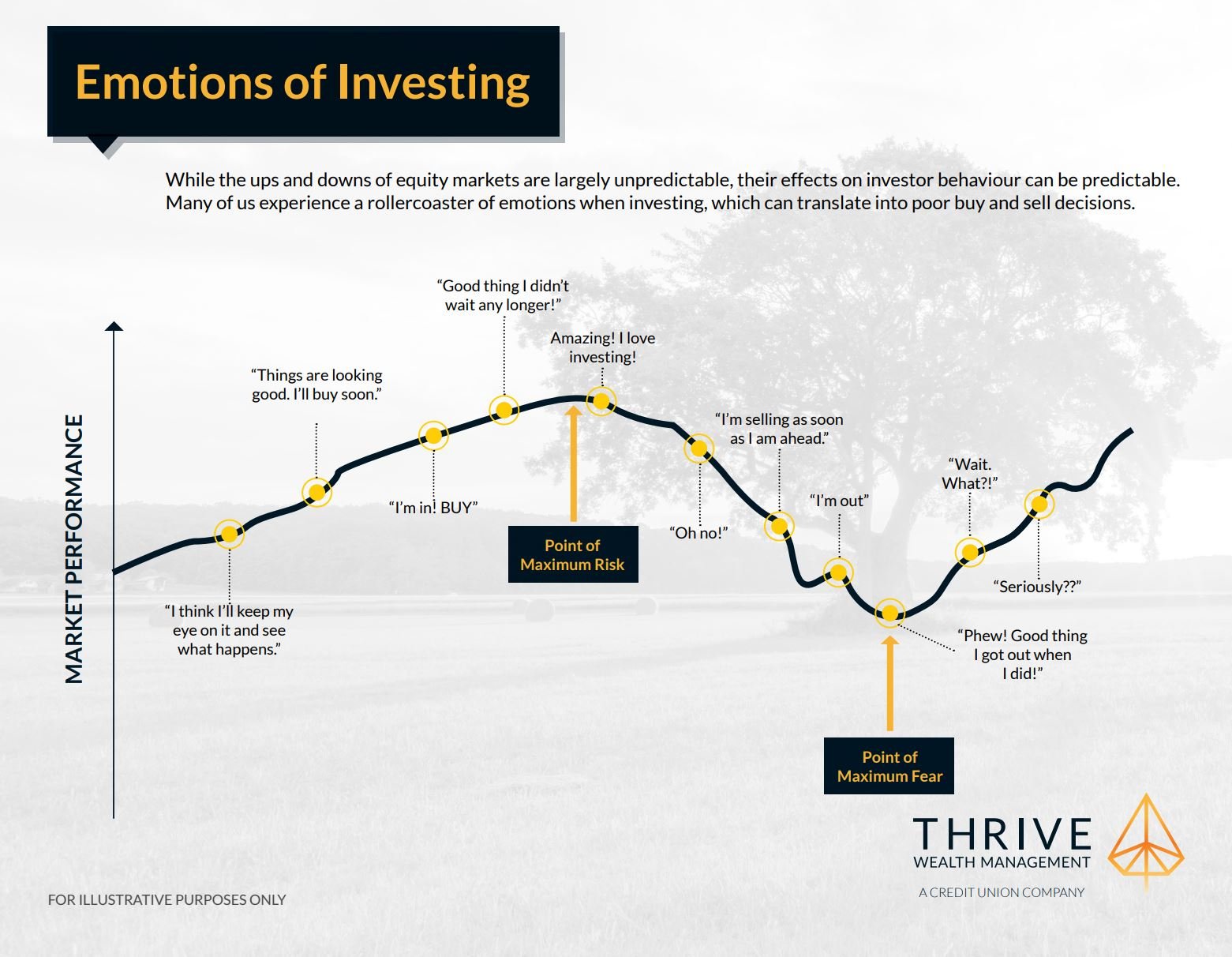
If watching the hit TV drama This is Us, or any other TV drama for that matter, has taught us anything, it’s how to ride the curves of an emotional roller coaster. We start each episode with a mix of reluctance and anticipation, unsure of what the future holds or whether we’re equipped for the gut-wrenching turns ahead. Our optimism grows, and soon we’re excited, then downright exuberant.
But just as our hearts are bursting with all the feels, things take a drastic twist. Suddenly we’re plummeting through denial, fear and desperation, into the depths of despair. We coast along, despondent, toward a glimmer of hope. Our optimism begins to rise and we start the climb again.
Yes, this is what it feels like to watch This is Us, in every single episode.
It’s also the cycle of emotions we feel when we invest.
Why are we emotional about investing?
Money represents our values, which drive our emotions, which influence our actions. Although we might think our financial decisions are guided by our rational, level-headed minds, the truth is that they are far more likely to be driven by our somewhat irrational hearts. Even savvy investors have to contend with their emotions. In fact, emotions have such a big impact on the financial choices we make that it’s become a whole area of study known as ‘behavioural finance'
At one point or other, you may have felt an inkling of anxiety over a small ‘splurge’ purchase, or experienced a rush of victory after scoring a big discount. Investing raises the emotional stakes, and magnifies those same feelings we get from small wins and losses.
Maybe it’s the long(er) term commitment, the volatile nature of the market, the lack of control – or the fear of taking too much control. Whatever the reason, choosing what and how to invest feels like a much bigger decision than managing the flow of cash in and out of our spending accounts, and the risk of getting it wrong can be scary. So much so, in fact, that many of us avoid investing entirely.
Fortunately, we can use the emotional roller coaster of investing to our advantage. Because the more we understand about how investing makes us feel, the more empowered we become to make smarter financial decisions.
Focus on your long-term goals, not your immediate comfort
According to this Barclays’ white paper a few years ago called 'Cycle of Investors Emotions,' investors who regularly changed their investment portfolio saw lower returns than those who left their investments alone. Simply put, the more we micromanage our money, the more we stunt its ability to grow.
In this illustrative chart below (for illustration purposes only) we can see how our emotions (yellow) are directly linked to market performance (black trend line).

Unfortunately, when we allow our emotions to drive our investment decisions, our immediate need for emotional comfort often overrides our long-term investment goals. So how do we overcome this?
To start, we need to figure out what our emotional comfort zone is by understanding our personal risk tolerances. Then we need to develop an investment portfolio that reflects those tolerances. The more our investments perform within our comfort zone, the more likely we are to stick with them for the long term.
Of course, rooting ourselves too firmly within our comfort zone also comes with a cost. As the Barclays’ white paper notes, behavioural science studies have shown that “the need for emotional comfort can cost us 2 to 3% per year in foregone investment return.” It may not sound like much, but that small percentage increase can add up to a big difference over time. So find your comfort zone, but don’t be afraid to play outside of its limits.
Go against your gut
If investing is an emotional roller coaster, its rise and fall generally leads to two scenarios. The first is the ‘fear of missing out’. This means that when markets are strong and things are going well, we tend to become more courageous, and even risqué, with our money. We worry that we’re about to miss the next big opportunity; that everyone else will score big, and we’ll be left in the dust.
On the other side of this is the fear of losing, or “loss aversion,” which occurs when the markets drop and we feel an unshakeable pressure to cut our losses and run. This is often the stronger force as most of us believe the pain we’ll feel from losing money is greater than the pleasure we’d get from gaining the same amount.
In other words, we put greater value on money we already have than on money we could potentially get; hence the adage: “A bird in the hand is worth two on a tree.”
In both scenarios, if we followed our gut reaction and let fear dictate our actions, we’d do the opposite of smart investing: we’d buy high and sell low. But now that we understand what’s driving our feelings, we can use this knowledge to our advantage. Because if we’re feeling a certain way, the chances are good that other investors are feeling that way too.
Being in touch with our emotions helps us better predict the market and act accordingly. As Warren Buffet said, “Be fearful when others are greedy, and be greedy when others are fearful.”
Ask for help
Our personal relationship with money is unique, but that doesn’t mean we have to go it alone. Relationships are hard, and this one is no exception. If we want to build a healthy, lasting relationship, it makes sense to seek professional help.
A wealth advisor can help you figure out your risk tolerances and build an investment portfolio that works within them. They can also help you to understand the market and recognize when it makes sense to trust your gut and when to buck the trend. Above all, they’re there for you along the journey, to serve as a sounding board and an objective opinion.
Investing may be an emotional roller coaster. But it’s a ride worth taking.
At Thrive, our wealth team approaches each situation with a planning focus. We first understand your financial situation and your goals for you and your family. From there we work with you and our team of experts to develop a financial plan that will help you to achieve your goals all while maintaining your lifestyle
Ready to get started?
Mutual funds and other securities are offered through Credential Securities, a division of Credential Qtrade Securities Inc. Credential Securities is a registered mark owned by Aviso Wealth Inc.
Mutual funds are offered through Credential Asset Management Inc.



